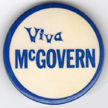The passing of George McGovern yesterday provides a unique opportunity to reflect on a history professor-turned-elected official who fundamentally changed the presidential selection process and realigned the modern Democratic Party.
The young McGovern flew multiple bombing missions in World War II as part of the fight against fascism. As part of the effort to create a better world, he directed the Food for Peace program in the Kennedy administration and shaped the modern food stamp program that has assisted farmers and low-income Americans.
He supported the organizing efforts and national boycotts of the United Farm Workers. But his most lasting impact relative to Latinos revolved around reforming the presidential selection process to include delegate quotas for members of underrepresented minority groups, a process that continues to this day.
He chaired what became known as the McGovern Commission, convened in the aftermath of the bitterly divided 1968 Democratic convention in Chicago that dramatically changed the presidential selection process and the composition of state delegations.
Under his guidance, the Democratic Party moved away from unpledged delegations selected by party leaders toward primary elections that selected delegates pledged to candidates based on the proportional primary election results. Candidates, moreover, were required to select Latino and African American delegates reflective of state populations.
The new rules helped McGovern capture the 1972 Democratic presidential nomination (against President Nixon). The composition of McGovern’s supporters further magnified the impact of the new rules as civil rights and anti–Vietnam War activists rallied to his campaign.
This dramatic impact was seen in California, where United Farm Workers’ cofounder Dolores Huerta, who had been critical of both President Lyndon Johnson and President Richard Nixon, now served as a delegation leader.
A supporter of diversity, McGovern may have been influenced by experiences as a graduate student, 24 years earlier, when he attended the 1948 Progressive Party convention that nominated former vice president Henry Wallace.
That convention and campaign foreshadowed McGovern’s own bid for the White House because Wallace attracted the backing of Latinos, African Americans, the young, the labor left, and peace activists (in this case, those opposed to the emerging Cold War with the Soviet Union).
McGovern, in facilitating the emergence of minority and peace-oriented forces into the decision-making process within the Democratic Party, changed its long-term trajectory.



